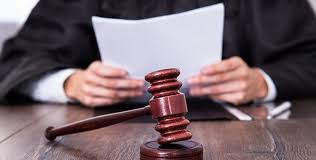If you’ve ever wondered about the pivotal moment when a criminal case begins its journey through the legal system, an arraignment is where it all starts. Understanding this crucial step can shed light on the complexities of the legal process and how it impacts the accused.
From the formal reading of charges to the defendant’s plea options, each aspect of an arraignment plays a significant role in shaping the course of a case. Stay tuned to grasp the intricacies of this essential legal procedure.
Definition of Arraignment
Arraignment is a crucial legal proceeding where the defendant is formally charged and enters a plea in court. This is typically one of the first steps in a criminal case, and it sets the tone for the legal proceedings that will follow. During the arraignment, the charges against you’re read aloud, and you’re asked to enter a plea of guilty, not guilty, or no contest. It’s important to take this step seriously, as your plea can have significant implications for the rest of your case.
Additionally, the arraignment is where the judge will determine your bail amount or decide if you can be released on your own recognizance. This decision can greatly impact your freedom leading up to your trial. It’s essential to have legal representation present during your arraignment to ensure that your rights are protected and that you fully understand the charges against you. By participating actively and engaging with the arraignment process, you can start building a strong defense for your case from the very beginning.
Purpose of Arraignment
Understanding the purpose of an arraignment is essential for navigating the early stages of a criminal case efficiently. An arraignment serves as a crucial step in the legal process where you, as the defendant, are formally informed of the charges brought against you.
It’s an opportunity for you to enter a plea, typically of ‘guilty,’ ‘not guilty,’ or ‘no contest.’ Additionally, the arraignment allows the court to set bail conditions or determine if you can be released on your own recognizance until the trial. This phase also ensures that you’re aware of your rights, such as the right to legal representation.
Moreover, the arraignment sets the tone for the rest of the legal proceedings, establishing deadlines for filing motions and scheduling future court dates. By understanding the purpose of the arraignment and actively participating in this process, you can better prepare for what lies ahead in your criminal case.
Rights of the Defendant
You should be aware of your legal rights as a defendant, including protections that ensure a fair trial. These rights are crucial for safeguarding your interests and ensuring due process is followed throughout the legal proceedings.
Understanding and asserting your rights can significantly impact the outcome of your case.
Defendant’s Legal Rights
During an arraignment, the defendant is informed of their legal rights, ensuring they understand the protections afforded to them under the law. These rights include the right to remain silent to avoid self-incrimination, the right to legal representation, and the right to a fair and speedy trial.
The defendant has the right to know the charges brought against them and to challenge those charges. Additionally, they’ve the right to confront witnesses, present evidence, and appeal a conviction if found guilty.
Understanding these rights is crucial for the defendant to actively participate in their defense and ensure that their legal interests are protected throughout the legal process.
Fair Trial Protections
To ensure a fair trial, you’re entitled to specific protections under the law, including the right to legal representation and the opportunity to challenge charges brought against you. This means you have the right to have a lawyer present during all critical stages of the legal process, such as arraignments, hearings, and trials.
Your legal counsel will help you understand the charges against you, advise you on your legal rights, and represent your interests in court. Additionally, you have the right to confront witnesses brought against you, present evidence in your defense, and remain silent if you choose to do so.
These fair trial protections are fundamental to safeguarding your rights and ensuring a just legal process.
Process of Arraignment
The process of arraignment involves the defendant appearing before a judge to hear the charges against them and enter a plea. During the arraignment, the judge will inform you of the charges brought against you by reading them aloud. This is a critical moment where you’ll have the opportunity to understand the accusations being made and how the legal process will proceed.
You will then be asked to enter a plea. The most common pleas are ‘guilty,’ ‘not guilty,’ or ‘no contest.’ If you plead guilty, you’re admitting to the charges. Pleading not guilty means you deny the charges and require a trial to prove your innocence. A plea of no contest means you don’t admit guilt but also don’t contest the charges.
Additionally, during the arraignment, the judge may address bail and any conditions for your release before the trial. It’s essential to be prepared and have legal representation to navigate this process effectively.
Plea Options Available
When facing an arraignment, you’ll need to understand the plea options available to you. Knowing the plea types and the legal consequences associated with each is crucial.
Make sure to carefully consider your choices and their potential outcomes before proceeding.
Plea Types
When facing arraignment, individuals typically have the option to choose from different plea types. The most common plea types include ‘guilty,’ ‘not guilty,’ and ‘no contest.’
By entering a plea of ‘guilty,’ you’re admitting to the charges against you. A plea of ‘not guilty’ means you deny the charges and require the prosecution to prove your guilt beyond a reasonable doubt.
Opting for a plea of ‘no contest’ means you neither admit nor deny the charges but accept the punishment as if you were guilty. It’s crucial to understand the implications of each plea type before making a decision. Consulting with your attorney can help you navigate the choices and make an informed decision.
Legal Consequences
To understand the legal consequences of different plea options available during arraignment, consider the implications of each plea type carefully.
At arraignment, you typically have three plea options: guilty, not guilty, or no contest (nolo contendere).
Pleading guilty means accepting responsibility for the charges, leading to a conviction on your record.
A not guilty plea contests the charges, requiring the prosecution to prove your guilt in court.
Opting for a no contest plea means you neither admit nor deny the charges but accept the punishment; this plea can’t be used against you in civil court but may still result in consequences.
Understanding these plea options is crucial in determining the best course of action for your case.
Consequences of Different Pleas
Understanding the legal consequences of different pleas is crucial during the arraignment process. When you enter a plea of guilty, you’re admitting to the charges against you. This plea can result in a conviction and may lead to sentencing. It’s important to consider the potential penalties and impact on your record before choosing this plea.
On the other hand, if you plead not guilty, you’re denying the charges and asserting your innocence. This plea will lead to a trial where the prosecution must prove your guilt beyond a reasonable doubt.
Pleading no contest means you don’t admit to the charges but also don’t contest them. This plea is treated similarly to a guilty plea in terms of sentencing. Understanding the implications of each plea can help you make an informed decision that aligns with your legal strategy and goals.
Importance of Legal Representation
Securing competent legal representation is essential for navigating the complexities of the arraignment process effectively. An experienced attorney can guide you through the legal proceedings, ensuring that your rights are protected and that you understand the charges brought against you. During the arraignment, the prosecutor will present the charges, and you’ll be asked to enter a plea. Your attorney can explain the implications of each plea option, helping you make an informed decision based on your specific circumstances.
Legal representation is crucial in negotiating potential bail conditions or arguing for a lower bail amount. Your attorney can advocate on your behalf, presenting factors that support a reduced bail or no bail requirement. Additionally, having a lawyer by your side can help expedite the process, as they’re familiar with the legal system and can navigate it more efficiently than if you were to represent yourself. Ultimately, investing in competent legal representation can significantly impact the outcome of your arraignment and subsequent legal proceedings.
Frequently Asked Questions
Yes, as a defendant, you can choose not to attend your arraignment. However, it is highly recommended that you consult with your attorney before making this decision to fully understand the potential consequences of your absence.
If you plead not guilty at your arraignment, the court will likely schedule a trial date. During trial, evidence will be presented, and both sides will argue their case. You have the right to defend yourself.
Yes, arraignments are typically held in a courtroom. It’s where you’ll be formally charged and asked to enter a plea. The setting allows for the legal process to proceed by addressing the charges against you.
Conclusion
In conclusion, understanding the arraignment process is crucial for any defendant facing criminal charges. It’s the first official step in the legal process and sets the tone for the rest of the case.
Knowing your rights, plea options, and the consequences of different choices can greatly impact the outcome of your case. It’s highly recommended to seek legal representation to ensure your rights are protected and to navigate the legal system effectively.


